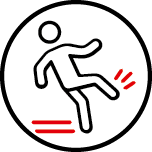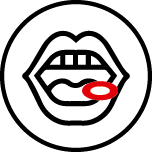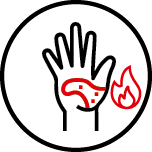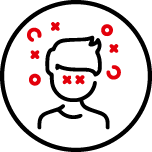They are adventurous and love to explore the world around them. On doing so, children sometimes overestimate their abilities and at the same time underestimate potential hazards. Minor accidents are part of everyday life and also play an important role in developing an intuitive sense of risk. Fortunately, the pain is usually quickly forgotten.
Many children’s accidents can be avoided by making sure that your home and garden is safe. The information brochures published by the Swiss Council for Accident Prevention (bfu) provide useful tips on how to achieve this. But despite all precautions, sometimes something more serious happens. Then you should act prudently and quickly – the first few minutes after an incident are often crucial. Even if you are very worried about your child, try to stay calm – in line with the slogan, “look, think, act”.
In the event of difficulty in breathing, hypothermia or heatstroke, young patients have little reserve capacity before a life-threatening condition develops. Regardless of which emergency number you call, the various rescue services are very closely networked – professional help is available no matter where you are and if necessary you will be put through to the correct service within seconds.
Rega is there for you
Always call out Rega direct via the emergency number 1414 or the Rega app if you requireimmediate assistance by rescue helicopter. This is particularly the case with seriously injured or ill children or in remote locations. Speed is one of the main advantages offered by a Rega helicopter, which makes it the best choice when swift and gentle transport to a central hospital is vital – for example, if the emergency involves a child. If in doubt, it is better to raise the alarm once too much than once too little. Rega’s Operations Centre is staffed by competent flight coordinators, who will already be able to help you over the phone.
We have summarised some useful information relating to emergencies with children. However, this is no substitute for a first aid course or comprehensive advice from specialists.
Important emergency numbers and apps
144: Ambulance (for all medical emergencies)
145: Tox Info Suisse (in case of suspected poisoning)
1414: Rega
117: Police
118: Fire service
112: European emergency no.
Rega emergency app: rega.ch/app
SRC first aid app: available in the app stores




